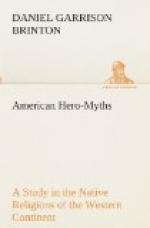Nor did he neglect the children he had thus brought into the world of his creation. Having closely studied how the spider spreads her web to catch flies, he invented the art of knitting nets for fish, and taught it to his descendants; the pieces of native copper found along the shores of Lake Superior he took from his treasure house inside the earth, where he sometimes lives. It is he who is the Master of Life, and if he appears in a dream to a person in danger, it is a certain sign of a lucky escape. He confers fortune in the chase, and therefore the hunters invoke him, and offer him tobacco and other dainties, placing them in the clefts of rocks or on isolated boulders. Though called the Giant Rabbit, he is always referred to as a man, a giant or demigod perhaps, but distinctly as of human nature, the mighty father or elder brother of the race.[1]
[Footnote 1: The writers from whom I have taken this myth are Nicolas Perrot, Memoire sur les Meurs, Coustumes et Relligion des Sauvages de l’Amerique Septentrionale, written by an intelligent layman who lived among the natives from 1665 to 1699; and the various Relations des Jesuites, especially for the years 1667 and 1670.]
Such is the national myth of creation of the Algonkin tribes, as it has been handed down to us in fragments by those who first heard it. Has it any meaning? Is it more than the puerile fable of savages?
Let us see whether some of those unconscious tricks of speech to which I referred in the introductory chapter have not disfigured a true nature myth. Perhaps those common processes of language, personification and otosis, duly taken into account, will enable us to restore this narrative to its original sense.
In the Algonkin tongue the word for Giant Rabbit is Missabos, compounded from mitchi or missi, great, large, and wabos, a rabbit. But there is a whole class of related words, referring to widely different perceptions, which sound very much like wabos. They are from a general root wab, which goes to form such words of related signification as wabi, he sees, waban, the east, the Orient, wabish, white, bidaban (bid-waban), the dawn, waban, daylight, wasseia, the light, and many others. Here is where we are to look for the real meaning of the name Missabos. It originally meant the Great Light, the Mighty Seer, the Orient, the Dawn—which you please, as all distinctly refer to the one original idea, the Bringer of Light and Sight, of knowledge and life. In time this meaning became obscured, and the idea of the rabbit, whose name was drawn probably from the same root, as in the northern winters its fur becomes white, was substituted, and so the myth of light degenerated into an animal fable.




